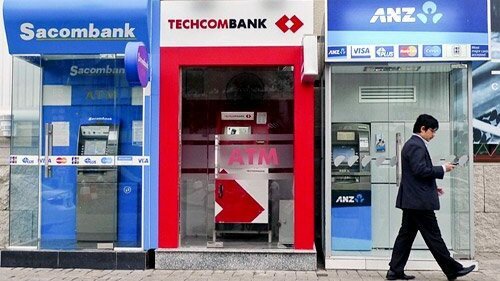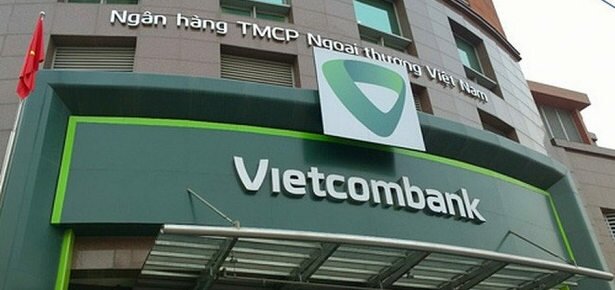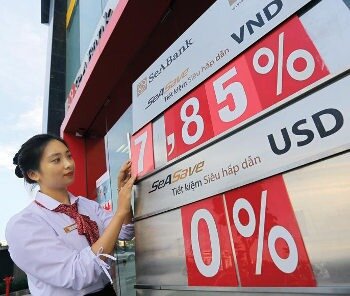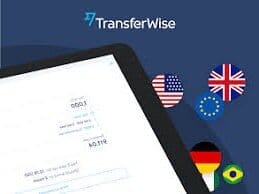Opening a bank account in Vietnam if you live in Vietnam is a necessity. Just making a withdrawal from a ATM with a foreign credit card can quickly lower your funds. You will do the calculation yourself, but when you take into account the ATM fees, the conversion fees (usually between the euro and Vietnam dong) and then the fees of your bank abroad, you will see what you lose with each transaction and it can add up very quickly! Many shopping sites do not accept foreign credit cards, which makes life difficult for expatriates if they want to order a product on the internet, book a movie ticket, pay their rent and have a record of the transaction to reassure themselves.

It is clear that having a bank account can make many things easier. No matter the length of your stay in Vietnam. Even with only a tourist visa, some banks in Vietnam allow interested people to become account holders in just a few minutes.
⚠️ Since October 2019, Vietnamese law has become stricter regarding the opening of bank accounts for foreigners. The legislation tends to allow only expatriates working in Vietnam. Thus, if you only have a Tourist Visa, you will no longer be able to make cash deposits at the counter. You should still be able to open an account (by writing a affidavit certifying you are not doing any work in Vietnam), but you will not be able to deposit money at the counter. These new rules are following the trend implying foreigners to register with the Vietnamese tax administration to be able to control the taxes in Vietnam for tax residents. If you live in Vietnam, you should also be interested on our two studies regarding :
- how to send money abroad from / to Vietnam: a major issue that many foreigners working in Vietnam face during their expatriation
- how to open an account with a broker to increase your wealth through offshore investments you reside in Vietnam
The best banking solution in Vietnam for Expats
To cover the main questions we received from expats about the best bank account and bank to use in Vietnam for foreigners, here is a video that digests all the important points to have in mind.
➡️ If you are a tourist, if you are working or if you have an entrepreneurial project in Vietnam: I will share with you the best banking solution 🥇 fitting your profile. I will also introduce you some concepts that are essential when you want to open a bank account in Vietnam that will last in the long run.
Vietcom Bank, an affordable solution
There are many reliable banks in Vietnam and VietcomBank is one of them. For expats who wish to settle in Vietnam for several months to travel over a long period of time, do volunteering or even work, it is often recommended to open a bank account with a local Vietnamese bank. You will be able to transfer money from abroad while reducing the costs. I will introduce you how it works at the end of this article. Then, you siply have to withdraw your money from an ATM (almost) free of charge. For example, if you plan to stay one month, you can transfer about 900 euros that you will use during your stay.
Moreover, this will allow you to avoid having to exchange currencies. Also, funding your Vietnamese bank account from an international transfer from overseas is much more cost-effective than having to withdraw from an ATMs using a foreign bank card. However, you should know that there is a new generation of Fintech online banks that remain the recommended alternative for tourists and short term expats going to Vietnam. We will introduce it in detail at the end of the article.
Alternatives to Vietcom Bank
Vietcom Bank does not have a monopoly on creating accounts for expatriates in Vietnam. Even if they are just tourists, the French have the opportunity to turn to other institutions such as the ANZ bank, the ACB bank and many others. Many expatriates are also using Timo: the first online bank, a branch of VP Bank, which is also quite popular among the foreign community.

The biggest advantage with these banks is that they all have a branch in district 1 of Ho Chi Minh City. As a result, it has never been easier for an expatriate to find several banks at once and choose the one that suits them best.
What Do I Need and How to Open a Bank Account?
Vietnamese banks are not demanding. Tourists who have been in Vietnam for even a month can go to any branch with their passport and visa. If you plan to stay longer and receive a salary, you should bring your resident card, work permit and work contract. Tourists will still be able to open an account in foreign currency (US dollar and Euro) or use local currency to make it more convenient without any currency conversion.
Open an account at Vietcom Bank
The formalities of opening a transfer account in this bank attract many tourists. Indeed, it is enough to deposit a minimum of twelve US Dollars and to provide only a fee of two euros if you intend to close the account before the first year. Of course, the bank does not provide a withdrawal card for foreign currencies. However, the debit or credit card for the local currency (Dong) is available. In order to encourage tourists to convert their currency, the bank takes a 0.165% commission for all foreign currency withdrawals, while withdrawals in Dong do not involve any additional fees.

To fill in the documents and open an account, it is preferable to contact agencies that are used to dealing with tourists who do not necessarily understand Vietnamese.
We recommend the bank office located near Ben Thanh Market (132 Ham Nghi) in the heart of District 1 in Ho Chi Minh City. It takes about 30 minutes to complete all the paperwork. You will be able to benefit from web access, a mobile application and a Mastercard or Visa debit card. Even if you do not have a work permit (you receive money from a foreign company or you are retired with a pension received on your foreign account), you can open an account and notify them that you will not receive any salary or bonus in Vietnam. Then you will be able to receive international foreign wire.
Open an account at ANZ Bank
This bank attracts visitors from Vietnam with its wide range of possibilities. To open an account in local currency, all you need to do is make a first deposit of at least 3 million dongs, which is the equivalent of 150 US dollars. To hold a foreign currency account, you would need 300 euros or US dollars. To use a withdrawal card, you would have to pay a fee of $10 per year. To have a balance lower than the deposit is sanctioned by a withdrawal of 200,000 dong. Closing an account before its anniversary requires the payment of $30. Like most banks in Vietnam, a 0.2% fee is applied to foreign currency withdrawals. It is wise to use your first and last name on the account for fear of having signatures that do not resemble each other.
Life in Vietnam as an expat may interest you. If you want to settle down there for a while, I recommend you to download our step-by-step guide to prepare your life there with updated advices for expats.
Click here to join my private club and receive more information about personal finance
FAQ about Banking: Answers to the most asked questions in 2020
💥 Which one to use – Vietcombank, Sacombank, Timo Bank ?
Until very recently, Timo Bank (a subsidiary of VP Bank) was often recommended to expats for their flexibility in opening an account. It was possible to open an account directly from a mobile application, scan your documents and do it entirely remotely. Since the recent changes on the policy and rules of issuing bank accounts for foreigners, it is not so easy anymore to open a bank account in Vietnam. From now on, trusting a bank such as Vietcombank (which offers ATMs in all countries) is the best advice you could get.
🇻🇳 Local or international bank for expats ?
If you are an entrepreneur, an investor and you plan to repatriate funds abroad or do business with Vietnam, you should use international banks such as Standard Chartered, Citibank, Shinhan. However, if you just want to use a local bank to save money and avoid fees, make international transfers and be able to withdraw at ATMs, then a local bank will be enough.
👮 Regulations and restrictions for foreigners
Within a few months, the regulations for opening and maintaining accounts for foreigners have become extremely tightened. Thus, you can generally still have a bank account with a short-term or tourist visa. However, you will not be able to receive money on your account if the transfer is made from another Vietnamese account. For example, you will not be able to receive salary from a Vietnamese company on your account if you do not provide them proof documents. In order to be in good standing, you will generally be required to have an employment contract, a work permit and the opening of an account denominated in Vietnam Dong (local currency) in order to receive your salaries.
Bank account in Vietnam: which use to choose the best option
Different scenarios are possible if you want to minimize your bank charges. If you work in Vietnam and receive a salary, you will soon be asked for a local bank account. You can turn to the banks we recommended earlier in this article to ensure a quality service, distributors present throughout the country. For many jobs, you can also be paid by hand. In this case, you are free to use your salary over time to pay for your current expenses.

For those who come to work in Vietnam with expatriate schemes or via executive profiles (employees seconded from a French company for example, executives who work between South East Asian countries, etc.), the question of bank accounts requires more thought. Indeed, it is easy to receive money in the country (for example, to send a French pension or a salary from a foreign company to a Vietnamese personal account) but it is very difficult to get money out of the country. Thus, for an expatriate who works for one, two or three years in Vietnam and intends to stay there for only a fixed period of time, they will have to ensure that they will eventually be able to recover the money they have left in their bank accounts in the country. This can be tricky if you trust a local bank that is not used to working with this type of expatriate. Our analysis introduce earlier “sending money overseas from / to Vietnam” covers all the solutions expats may have in mind, pro and cons of each ones and costs involved if you need to get money out of Vietnam. Thus, in this case, choosing an international bank that has a presence in Vietnam such as Standard Chartered, HSBC, or Citibank will be preferable because the banks will not have any difficulty when you tell them that you want to close your account or withdraw part of your savings.
Savings account for Vietnamese Banks : what you shoud know ?

USD or VND savings account in Vietnam with 8% interest. If you have to travel to South East Asia (Thailand, Cambodia, Laos,…), be aware that traditional Vietnamese banks are not very flexible on withdrawals abroad. For example, do not close your French bank account and always keep two or three withdrawal cards if you are travelling or on business in neighbouring countries.
These limitations stem from the country’s desire to keep its capital and control over its currency. This is why we see so many promotions on savings accounts that earn 7% to 8% per year in the country.
Savings accounts – USD or VND – what to choose?
When you go to meet the banks to open an account, you will be offered a savings account. If you want to add one to your account, it can earn you up to 8% per year. The proposal is tempting but you have to take a look at what this 8% annual interest really means. To do this, here are three main criteria to evaluate:

Why choose a USD bank account in Vietnam instead of VND: inflation, devaluation of the VND currency and guarantees offered by banking institutions
- the currency in which this interest is generated: is it the US dollar (USD), euro (EUR), VND (Vietnam dong)…
- the guarantees offered by the banks on your investment: is your money and initial investment guaranteed?
- the inflation present in the country: i.e. how much do prices increase on average per year in a certain currency ?
Since our article is aimed at general public education, we will not go into this in more detail and will give approximations. Here is the synthesis:
Taking into account price inflation in Vietnam, it can be seen that currency dilution (loss of the value of the VND against the USD) and interest rates that seemed very high are not so attractive in the end when compared to a fixed foreign saving account in your home country. When you add the guarantees offered by Vietnamese banks regarding insurance and default risks in return, you realize that you shouldn’t bet your entire savings strategy on these investment opportunities.
Wise , the Ultimate Solution for Tourists and Expats
For those who come to Vietnam without having a solution to transfer money, Wise (ex Transferwise) is the easiest way to avoid paying exorbitant fees. Whether for personal or professional use, Wise interests customers by having no unpleasant surprises. The costs are even among the lowest on the market. As the service supports more than 300 currencies worldwide, Wise is the ideal partner for tourists who want an account with multiple possibilities and could still be used even when leaving Vietnam to move to another country.
An Experience to Live
 It is true that the service is quite new in Vietnam, with only a few years of presence in the Vietnamese banking world, but it does not have much that other banks envy. Those who have already had the opportunity to try Wise have enjoyed the experience. Already used in other Asian countries such as China, it has never been easier for expatriates to send international money or receive transfers from their accounts in France or Europe.
It is true that the service is quite new in Vietnam, with only a few years of presence in the Vietnamese banking world, but it does not have much that other banks envy. Those who have already had the opportunity to try Wise have enjoyed the experience. Already used in other Asian countries such as China, it has never been easier for expatriates to send international money or receive transfers from their accounts in France or Europe.
How Does it Work?
When using the Wise (ex Transferwise) service, the customer should expect a transfer cost of 1.5% and it takes a maximum of two days for the recipient’s account to be credited. Wise offers not only the cheapest transfer costs on the market, but also the fastest transfers for expatriates. Moreover, since it is possible to verify the amount to be received at the end of the transfer in advance, it is easy to compare the service with the payment system and assess how practical and cost effective it is. In addition, to make a transfer, it is sufficient to indicate the name of the recipient, his account number, his bank code and the BIC/SWIFT code.
Wise saves you the fees usually applied by traditional banks: international transfer fees from your home country bank, currency conversion, reception fees from your Vietnamese bank. A welcome offer is available on Wise to allow you to test the international wire service and compare fees with your traditional bank.
0% fee on your first Wise transfer (*)
(*) Up to 500€: you have no fee to test the flexibility of Transferwise and receive money on your bank account in Vietnam.
New Fintech Online Banks: Revolut, Bunq, n26
These new online services offer Europeans online debit cards and accounts that allow them to store and convert currencies at attractive rates. Indeed, the costs in Vietnam are generally from:

- ATM to make your card withdrawals charge a fee for each transaction (generally a fixed fee from 20000VND to 80000VND for foreign cards.
- Banks themselves that convert your currency (usually from the Euro if you have an account in Europe) into Vietnam Dong. This conversion can be minimized by using one of the cards from these new online banks.
The ideal way to travel is to bring one of these cards with you. You will save several tens of euros during your stay. Our recommendation among the latter regarding our use in Vietnam is Revolut.

We heard from people who had problems with their N26 cards: they had various problems involving blocked cards or authentication requests from Vietnam by N26 teams. That is why we recommend the Revolut alternative, which is very popular in Europe. Before you leave, you can open an account in a few minutes, validate the identification steps and receive your card in the coming days.
Opening the account and the card shipping is free of charge. Premium options offer additional benefits if you travel a lot and want to further minimize withdrawals from ATMs abroad and currency conversions.
Another very popular option is to convert your Euros or USD (US dollars) directly into jewellery, they usually provide a very competitive rate (less than 1% fee) which can be interesting if you arrive in Vietnam for a few days and can exchange your currency into local currency.
